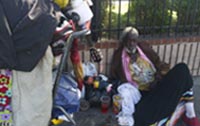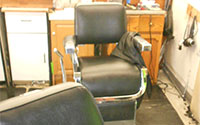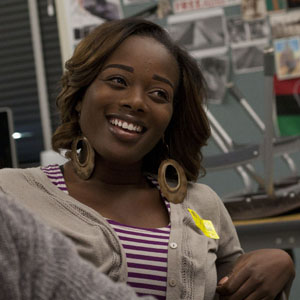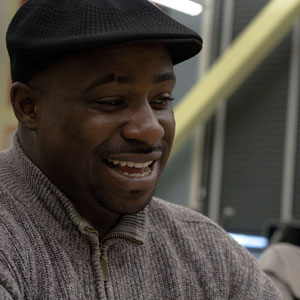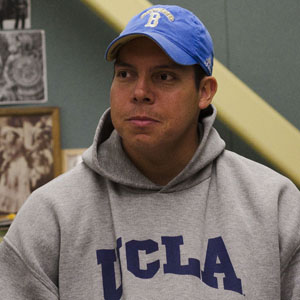Partially Participating: South LA's Political Voice
Residents of south Los Angeles participate in politics to varying degrees. Some find power in voting, some are not able to vote and some choose not to vote. While some residents are passionate about exercising their right to participate politically, others choose to work for change in their communities using other methods.
Homelessness is addressed in South Central LA with organizations such as Oasis Home, Friends Helping Friends LA, New Beginnings Christian Discipleship and Homeless Outreach Program/Integrated Care System (HOPICS).
Arnold Williams, a 55-year-old barber, has used barbering as a way to stay off the streets and provide financial stability for himself and his family for over 30 years.
Several years after their partnership began, LA's Promise and Manual Arts High School have made huge progress to improving the quality of education and of life for children in South LA.
The Vermont Square neighborhood has a diverse population of about 60,000 individuals. While the ethnic and social diversity reflects a desirable kaleidoscopic landscape, the community also faces a wide array of issues and concerns with 60,000 individual opinions on how to solve them.
The South LA Power Coalition, which launched earlier this year, is working to harness the diversity in South LA for political change. The coalition hopes to give political power to residents of South LA through common ground and a shared political movement.
One way the coalition tries to preserve unity is by finding common ground between the large Hispanic and African American communities in South LA.
"I can't think of any issue that we're talking about that doesn't affect all of our community. That's why we're here," said Ron Gochez, a member of the South LA Power Coalition and a candidate for Los Angeles Council District 9.
The coalition, realizing the need for the unity between these two groups began a Black and Latino workshop where they discussed issues affecting both communities and worked to find ways to solve them.
"The objective was not just to talk about the issues, but to try to come up with some ways, some objectives, some concrete ways of things that we can do as a black and brown community to work together," said Gochez.
The South LA Power Coalition feels that they have an advantage in reaching out to the diverse population of South LA because they are not affiliated with any group or political party. The coalition is an autonomous group of people passionate about seeing South LA empowered for political change.
"There's a degree of independence and an ability for us to take stances and take positions that other more prominent organizations can't do because they're tied to this or they're tied to that, and it gives us really the freedom to be able to do analysis, to pick things apart, and align them with just our values and values that are associated with working families," said Njideka Obijiaku, an active member of the South LA Power Coalition and the Ma'at Institute for Community Change.
None of the group's active members will call themselves leaders. They are all part of different organizations and groups in their communities and chose to come together to form a collaborative group in South LA.
"We've been working in our communities for several years and we understand the importance of not working independently of each other," said Gochez.
While the members of the coalition are very politically educated and active, they are the exception for South LA—an area that consistently has an extremely low voter turnout rate. During the 2012 presidential election, the coalition stated that there were precincts where less than half of the registered voters even came out to vote.
"But the problem is that it's not that people don't want to be active. People don't clearly sometimes know how and how being active impacts your life and your livelihood," said Kokayi Kwa Jitahidi, one of the organizers of the South LA Power Coalition and member of MA'AT Institute for Community Change.
The South LA Power Coalition strives to educate residents in South LA on how to vote and on how voting can impact their daily lives. Prior to the 2012 election, the coalition held a voter education workshop at Maya Angelou school where they released a voter guide and educated the community on the different measures on the ballot.
While the voter guide gave specific ways in which to vote for each proposition, the coalition's main goal is not to advocate a specific group or political position. According to their founding members, their goal is to help the residents of South LA define a vision for themselves and work to see it put into action. The coalition believes that the issues and problems in South LA are a result of residents not being empowered.
"People who are most impacted are not empowered, and have not been empowered, to participate in a meaningful way in the political process, to make independent decisions for themselves—people are spoken on behalf of, but not worked with," said Jitahidi.
As the South LA Power Coalition continues their work in South LA and continues to develop as a group, the members hope to not only change policy, but also to gain political representation.
"We have to make this grassroots movement translate to political power. If we're going to get the changes and if we're going to effectively fight around the status quo, we've got to be able to translate that into political power," said Jitahidi.


